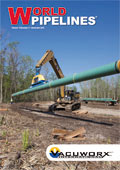Editorial comment
US Secretary of State Hillary Clinton made some remarks recently that certainly raised some hopes for pipeliners in North America, but at the same time, raised some eyebrows amongst environmentalists.
Register for free »
Get started now for absolutely FREE, no credit card required.
Whilst at a speaking engagement in San Francisco, Clinton was asked to defend the State Department’s decision to approve Enbridge’s Alberta Clipper pipeline, which ships oilsands crude to Wisconsin. In answering, she went on to say that a decision on another pipeline had yet to be made, and here she was presumably referring to Keystone XL - TransCanada’s proposed extension to the Keystone line, but that the State was inclined to approve it.
She said, “we’re not signed off on it, but we are inclined to do so, and we are for several reasons”.
Putting economy clearly over environment, Clinton said, “we’re either going to be dependent on dirty oil from the Gulf or dirty oil from Canada… until we can get our act together as a country and figure out that clean, renewable energy is in both our economic interests and the interests of our planet”.
That ‘dirty’ word no doubt refers to oilsands - the Keystone XL project would double the amount of current oilsands exports, transporting as much as 900 000 bpd of oil from Alberta to refineries on the Gulf Coast. Oilsands production has a much larger carbon footprint than conventional oil production and so the ‘dirty’ tag seems to stick.
So what made the pipeliners smile upon hearing Clinton’s comments? The project, if approved, would create 13 000 jobs, would bring US$ 20 billion into the US economy and, as Clinton argues, would reduce the country’s dependence on oil from elsewhere.
And what has made environmentalists frown? The US$ 7 billion, 2740 km, 36 in. diameter pipeline would travel through six US states, including Nebraska, where it would traverse directly the Ogallala Aquifer – one of the world’s largest reservoirs and a key water source for the region. Some are concerned that a pipeline leak here could devastate the agricultural industry.
However, TransCanada has pledged to build “the safest pipeline currently in the industry”, according to company spokesman Terry Cunha.
Cunha stresses that TransCanada has emergency response programmes in place so that if a problem did occur, the line can be shut down and the problem isolated in minutes.
TransCanada is hoping for a Presidential Permit approving the project some time early next year.
Whilst the Keystone XL proposal is still officially under review - the department extended its review of the pipeline proposal past its mid-September deadline at the insistence of the Environmental Protection Agency and Henry Waxman, a powerful California congressman who opposes oilsands and holds a lot of sway in Washington - Clinton’s acknowledgement of the government’s ‘inclination’ to approve it should be a huge encouragement to those who back the project, as this shows the government’s willingness to build a pipeline where and when it is needed, despite opposition.


